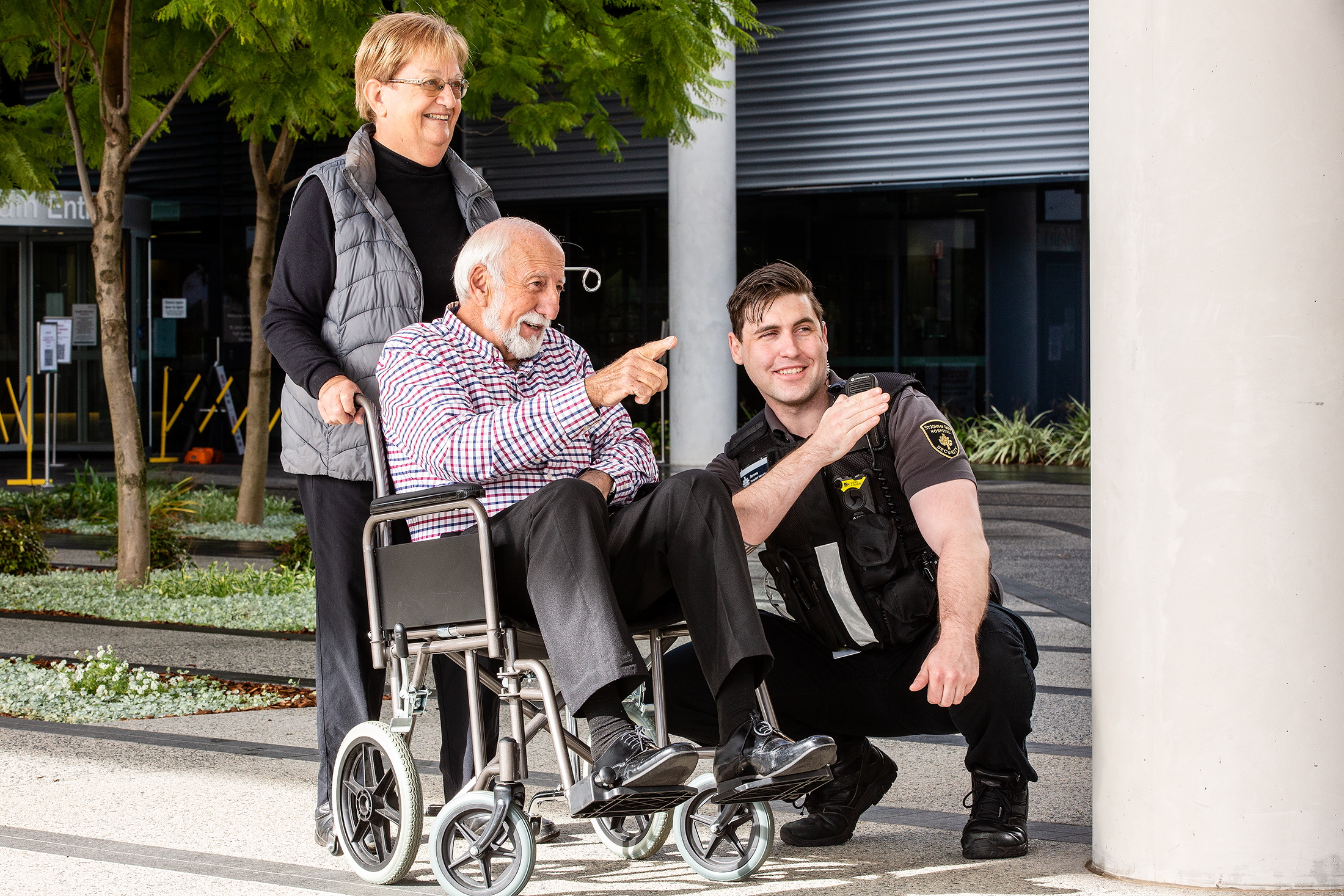Other legal disclosures
Expenditure on advertising
In 2021-22, EMHS did not incur any expenditure on advertising in accordance with section 175Z of the Electoral Act 1907.
Unauthorised use of credit cards
WA Government purchasing cards can be issued by EMHS to employees where their functions warrant usage of this facility.
These credit cards are not to be used for personal (unauthorised) purposes (i.e. a purpose that is not directly related to performing functions for the agency). All credit card purchases are reviewed by someone other than the cardholder to monitor compliance. If during a review it is determined that the credit card was used for unauthorised purchases, written notice must be given to the cardholder and the EMHS Board.
EMHS had seven instances (total amount of $439) where a purchasing card was used for personal purposes in 2021-22. A review of these transactions confirmed they were immaterial and the result of genuine and honest mistakes, and no further action was deemed necessary as prompt notification and full restitution was made by the individuals concerned. These were not referred for disciplinary action. Within the period of 1 July 2021 to 30 June 2022:
| Organisation | Total |
|---|---|
| Instances of use for personal purposes | 7 |
| Aggregate amount of personal use expenditure | $439 |
| Aggregate amount of personal use expenditure settled by a due date | 5 |
| Aggregate amount of personal use expenditure settled after the due date | 2 |
| Aggregate amount of personal use expenditure remaining unpaid at end of financial year | 0 |
| Number of referrals for disciplinary action instigated by the notifiable authority | 0 |
Compliance with public sector standards and ethical codes
Public Sector Standards
The Public Sector Standards in Human Resource Management (the standards) set out the minimum standards of merit, equity and probity to be complied with by WA public sector bodies and their employees.
WA Health and EMHS maintain Human Resource (HR) policies and guidelines that are consistent with the standards. These are available to all employees on the EMHS intranet and/or the WA Health policy frameworks internet pages. This includes:
- WA Health Grievance Resolution Policy and EMHS Employee Grievance Resolution Guidelines (revised March 2021), fact sheets and flow charts (new March 2021)
- WA Health Recruitment, Selection and Appointment Policy
- WA Health Discipline Policy and EMHS Discipline Guide
- EMHS Peak Performance Policy, guidelines, fact sheets and automated performance planning tool
- EMHS Employee Separation Policy
- EMHS Expression of Interest Guidelines and template.
HR Business Partners are available to provide information, guidance and support to line managers in application of these policies and procedures and for the management of any claims of breach of standards.
EMHS maintains and supports a network of trained Employee Support Officers. These employees provide a voluntary point of contact for employees with a workplace concern or query, which may include queries about the public sector standards or related processes.
EMHS utilises WA Health’s shared service centre Health Support Services (HSS) for transactional employment services. This enables consistent application of the employment standard and breach claim process to our recruitment and selection practices and provides an external mechanism for review.
Awareness of the public sector standards is communicated via:
- notification of the breach claim rights, processes and period within relevant employment and grievances processes
- provision of information on the EMHS intranet
- recruitment, selection and appointment training for recruiting managers and panel members; and
- peak performance training for line managers.
During 2021-22, there were:

breach of standard claims were lodged against the employment standard

was resolved internally and was withdrawn

is currently being managed by HR

were referred to the PSC (four dismissed, one ongoing)

claims against the grievance resolution, performance management, termination or redeployment standards

Code of Conduct
Integrity and ethical behaviour are integral to EMHS’ core business. EMHS is committed to:
- putting the public interest first and fulfilling our public duty
- making the right decisions in accordance with agreed policy and procedures, in line with organisational objectives and job requirements
- making decisions and taking actions that can be explained and justified.
WA Health and EMHS maintain integrity-related policies and guidelines that support the implementation of the WA Public Sector Code of Ethics and the WA Health Code of Conduct Policy. This includes policies that address the management of breaches of discipline; gifts, benefits and hospitality; additional employment; conflicts of interest; pre-employment integrity checks; record keeping; discrimination and harassment; workplace bullying; and use of official information. These policies are available to all employees on the EMHS intranet and/or WA Health policy frameworks page.
During 2021-22, EMHS has reviewed and updated two significant integrity-related policies. These are the EMHS Additional Employment Policy, which outlines the conditions under which EMHS employees may be permitted to undertake additional employment, and the Employee Interests Procedure – Management of Gifts, Benefits and Hospitality, Travel, Additional Employment and Conflicts of Interest. This procedure outlines EMHS processes for disclosing, documenting and managing these interests.
All EMHS employees are responsible for ensuring that their behaviour reflects the standards of conduct embodied in the WA Health Code of Conduct Policy.
To support awareness of their responsibilities, new staff receive and acknowledge the Code of Conduct as a part of their offer of employment to work with EMHS. Responsibility for workplace behaviours and conduct is reinforced at formal induction, and through completion of mandatory training, including Accountable and Ethical Decision-Making, Recordkeeping Awareness, and Prevention of Bullying.
In addition, EMHS has an Online Managers Induction eLearning Program. This program provides new and existing managers with the skills and knowledge they need to excel in their roles and provides a useful resource to refer to when needed, including modules on integrity, governance, decision-making and risk and compliance. Staff with direct reports and/or level G10 or above are required to complete this module within six weeks of commencement of employment.
EMHS regularly encourages staff to reflect on the EMHS values (including accountability, integrity and respect), and to incorporate these into their work. This occurs formally at recruitment and within the ongoing Peak Performance Program. Additionally, regular reminders about conduct-related topics are distributed across EMHS via electronic newsletters and on the EMHS intranet.
All staff are required to report suspected breaches of the Code of Conduct. Several pathways are available for staff to report concerns, including speaking with their line manager, a member of HR or the Manager of Integrity and Ethics, or by making contact with the EMHS Fraud Hotline, an EMHS Public Interest Disclosure (PID) Officer, the Corruption and Crime Commission (CCC), or the PSC. These options are communicated on the EMHS intranet, as well as at induction, on displayed posters and via Board and CE global messages and newsletter reminders.
The requirement to report suspected breaches of the Code of Conduct is also reinforced to nursing and pharmacy staff during Medicine Discrepancy Investigations training sessions, which are delivered regularly throughout the year by Integrity and Ethics staff.
The EMHS Ethical Conduct Review Committee (ECRC) meets bi-monthly. This committee was established to support EMHS to take a proactive approach to integrity and ethical conduct. The ECRC reports to the EMHS AEG and provides oversight in regard to:
- EMHS governance protocols and related documents for staff awareness and education
- the timely management of integrity and ethical governance issues to ensure compliance with relevant policy and statutory obligations
- the timely reporting of all misconduct matters in accordance with relevant policy and statutory obligations
- integrity and ethics activity data, in particular misconduct reports and related data, to monitor trends and issues across EMHS.
During 2021-22:

reports of potential breaches of the Code of Conduct (breaches of discipline) were received
All suspected breaches of discipline, including reportable misconduct were managed in accordance with the requirements of the WA Health Discipline policy and, where appropriate, were reported to the PSC or the CCC as required under the Corruption, Crime and Misconduct Act 2003. Where appropriate, breaches of discipline are also reported to the WA Police and/or to the Australian Health Practitioner Regulation Agency (AHPRA).

Disability access and inclusion
EMHS is committed to ensuring that people with a disability, as well as their families and carers, have the same opportunities as others to access the EMHS services, facilities and information.
The EMHS Disability Access and Inclusion Plan 2017-22 (DAIP) outlines the EMHS strategies for meeting seven desired disability outcome areas that were identified in the Disability Service Act 1993. Throughout 2021-22, a range of developments helped improve outcomes for consumers with a disability.
General services and events
Outcome one: People with disability have the same opportunities as other people to access the services of, and any events organised by a public authority.
In 2021-22, EMHS put a number of measures in place to improve access to our services, particularly with restrictions imposed due to COVID-19. These measures included:
- expanded use of volunteers at site entrances to assist with visitor enquiries and wayfinding
- purchase of additional wheelchairs for consumer transit, given reduction in access points to sites
- created and sign-posted additional rest stations in access walkways and rostered additional staff to assist people with disabilities to navigate to different areas
- increased use of WoWs and devices (e.g. tablets). to increase access to family meetings held in clinical areas and allow consumers to participate in external events, including funerals
- consideration given to accessibility of services and community events e.g. NAIDOC Week celebrations and Close the Gap events
- supporting overnight boarders for vulnerable patients.
Buildings and facilities
Outcome two: People with disability have the same opportunities as other people to access the buildings and other facilities of a public authority.
Regular and ongoing maintenance of EMHS buildings, grounds, car parks and facilities ensures we continue to meet compliance with relevant disability and access requirements.
EMHS has increased senior car parking and ACROD bays, with numbers above minimum requirements. Access to buildings was improved with better signage and the installation of ‘touchless’ entry and free-call phones at sites, as well as ramps to EDs, COVID ED marquees and COVID clinics.
At KH, the refurbishment and new day hospice facility incorporated disability access into designs, including refreshing of accessible toilet areas and additional ramp access to garden areas, enabling both wheelchair and bed access.
Information and communication
Outcome three: People with disability receive information from a public authority in a format that will enable them to access the information as readily as other people are able to access it.
EMHS’ Communications Team continually monitors EMHS publications and ensures that our consumers and community have the ability to obtain information in different formats and languages if required.
Initiatives to improve information and communication have included:
- progression of a signage and wayfinding review, with additional visual aids provided at key locations, including for directions to amenities
- increased variety and access to alternative ‘call buttons’ or communications with nursing staff on inpatient wards
- audit of hearing loop utilisation and accessibility of EDI internal resources
- utilisation of digital solutions to assist with communication.
For communication with our CaLD community, EMHS:
- provides ongoing access to a variety of interpreter services, including in-person, by phone and by Telehealth
- ensures Caring for Carers resources are available for CaLD groups
- makes various Aboriginal-specific services available across sites, including augmentation of resources to support weekend and after-hours accessibility.
Quality of service
Outcome four: People with disability receive the same level and quality of service from the staff of a public authority as other people receive from the staff of that public authority.
During 2021-22, EMHS has focused on accessibility as part of its organisation values.
This has included the expansion of the volunteer Forget Me Not program, which enables more time to create meaningful connections to support people with dementia and cognitive impairment through their hospital journey.
EMHS is also embracing technology to improve access, with the expansion of Telehealth (virtual care) access and training for outpatient services, and the trial use of virtual reality technology for palliative care patients to engage in experiences otherwise inaccessible due to loss of physical function (learn more).
Complaints and safeguarding
Outcome five: People with a disability have the same opportunities as other people to make complaints to a public authority.
EMHS provides a variety of methods for providing feedback and lodging complaints, including paper based, web/email, verbal and the Care Opinion platform, as well as feedback provided directly to staff and volunteers. Patient feedback and complaints are constantly monitored via EMHS’ consumer advisory committees/groups, as well as quarterly reviews at Disability Access and Inclusion committee meetings.
EMHS also installed visual aids and equipment regarding Aishwarya’s CARE call and other consumer-initiated care escalation pathways across hospitals, especially in EDs (learn more).
Consultation and engagement
Outcome six: People with disability have the same opportunities as other people to participate in any public consultation by a public authority.
Consultation and engagement activities with stakeholders was unfortunately limited in 2021-22 due to COVID. Where possible, however, EMHS has continued to involve consumers in service design and delivery.
In 2021-22 this included various site-level consumer engagement activities seeking input on design of new models of care (e.g. ED geriatrics team, COVID screening and COVID clinics), consumer representation on Disability Access and Inclusion Committees and diverse representation on site consumer advisory committees/groups.
EMHS also engaged with the community, including local high-school students, in planning for the new Shire of Serpentine Jarrahdale Byford Health Hub (learn more).
Employment people and culture
Outcome seven: People with a disability have the same opportunities as other people to obtain and maintain employment with a public authority.
In 2021-22, EMHS implemented a new Talent Acquisition Team to assist in recruitment strategies, incorporating equity and diversity principles (learn more). In addition, a new EMHS EDI role was created.

Recordkeeping
EMHS continues to implement an Electronic Document Records Management System (EDRMS) across its sites in accordance with the EMHS Recordkeeping Plan. There have been 120,901 records saved since implementation to 30 June 2022, with 371 active users within the system. All users have received EDRMS [HPE Records Manager (HPE RM)] training, either in face-to-face or group format.
Regular compliance audits are conducted, ensuring the HPE RM EMHS dataset is being maintained and corporate records are captured appropriately.
The EMHS Corporate Recordkeeping Strategy was approved by the AEG in March 2022, with objectives and key deliverables being scheduled across the remainder of 2022 and 2023. The Strategy reconfirms EMHS’ commitment to manage records in an effective and efficient manner and in accordance with the State Records Act 2000 (the Act).
A corporate recordkeeping project relating to hard-copy records across EMHS was undertaken in 2021-22. A review of archived records held at on-site locations was commenced in order to classify records in accordance with the relevant Retention and Disposal Schedules.
EMHS has a number of training programs in place to provide guidance to staff on good recordkeeping practices. This commences with the mandatory DoH Records Awareness Training and the EMHS EDRMS training. The EMHS corporate recordkeeping intranet page provides staff with training resources, quick help guides, policies and supporting information to enable staff to comply with the Act.
For the remainder of 2022, the Corporate Recordkeeping area will be focusing on developing standardised online training sessions and online video help sessions in a bid to streamline the training process across EMHS.

